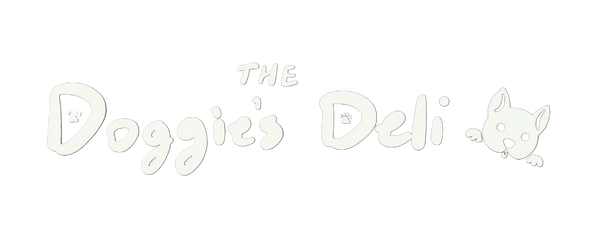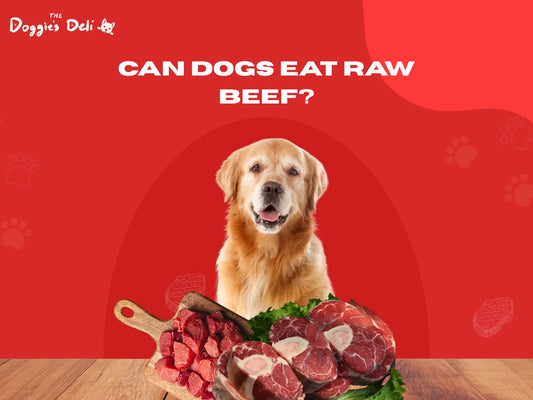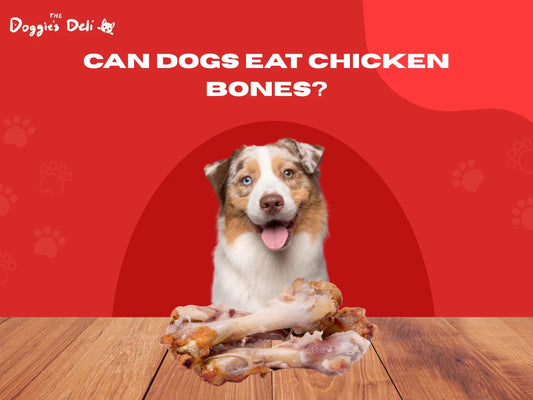
Can Dogs Eat Cooked Beef?
Share
Yes, dogs can eat cooked beef as long as it is plain, boneless, fully cooked, and served in portions appropriate to their size and breed. When prepared correctly, cooked beef is not only safe but also a nutrient-dense protein source that offers multiple health benefits for dogs, such as immune system support and muscle support.
Cooked lean beef typically contains 23-26 grams of protein and 10-15% of fat per 100 grams, depending on the cut. It is also naturally rich in vitamin B12, zinc, iron, selenium, and niacin, all of which support muscle strength, organ health, immune function, and cellular repair in dogs.
However, these benefits apply only when beef is prepared properly. Beef that is seasoned, high in fat, or cooked with onions, garlic, or sauces can be harmful and toxic to dogs. To keep your dog safe, always ensure that the beef is cooked thoroughly to an internal temperature of at least 160°F (71°C) and served plain, without any additives or excess fat.
Health Benefits of Cooked Beef for Dogs.
When served plain and fully cooked, beef provides dogs with essential nutrients that support overall health. From protein that builds strong muscles to fatty acids that enhance skin, coat, and joint health, it can be a valuable part of a balanced diet. Here are the key benefits:
1. Promotes Muscle Development
Protein plays a key role in your dog’s muscle strength, mobility, and tissue repair. Cooked beef, especially from lean cuts like sirloin or ground round, provides complete proteins for dogs that contain all the essential amino acids required for building and maintaining lean muscle mass.
These amino acids support muscle fiber regeneration, making cooked beef particularly beneficial for active dogs, puppies in growth stages, or dogs recovering from injury or illness. When included as part of a balanced diet, moderate servings of cooked beef help sustain healthy muscle tone, improve post-exercise recovery, and promote overall physical resilience of dogs.
2. Improves Coat and Skin Health
Cooked beef supports skin and coat health through its natural content of essential amino acids and fatty acids for dogs. Specifically, omega-3 and omega-6 fatty acids help maintain skin elasticity, reduce dryness and flaking, and enhance coat shine, making your dog’s fur visibly healthier and softer to the touch.
Amino acids such as methionine and lysine, found in cooked beef, are vital for the production of keratin, a structural protein that forms the foundation of strong, resilient hair and skin cells. These nutrients not only improve the look and texture of the coat but also strengthen the skin barrier, reducing the risk of environmental irritation and infections for your dog.
3. Supports Organ Function
Beef provides critical nutrients that directly support the function of major organs in dogs, including the heart, liver, and kidneys. Key vitamins and minerals, such as vitamin B12, iron, and zinc, which help to maintain cardiovascular efficiency, promote blood filtration, and support cellular metabolism in vital tissues for dogs.
Vitamin B12, found in beef, also plays a dual role by supporting red blood cell production and facilitating nerve signaling, both of which are critical for maintaining healthy heart rhythms and overall neurological stability in dogs. In addition to these micronutrients, cooked beef is rich in amino acids that aid in liver detoxification and help repair cellular structures across the organ systems of the dog.
4. Boosts Metabolism and Nerve Function
Cooked beef is a valuable source of B-complex vitamins and trace minerals that play a central role in supporting a dog’s metabolic activity and neurological health. Nutrients like vitamin B12, vitamin B6, and zinc are critical for converting food into usable energy, regulating enzyme function, and maintaining stable nerve signals.
Vitamin B6 contributes to amino acid metabolism and the synthesis of neurotransmitters such as serotonin and dopamine, which influence a dog’s mood, cognition, and behavior. Vitamin B12 supports myelin sheath formation, which protects nerve fibers and ensures accurate communication between the brain and body. Zinc, on the other hand, regulates enzyme activity and supports the thyroid, which governs energy production at the cellular level.
Strengthens Immunity and Bone Health
A balanced intake of specific nutrients found in cooked beef can significantly support a dog’s immune defense and skeletal structure. Minerals like zinc, iron, selenium, and phosphorus play interdependent roles in building a resilient immune system and maintaining bone strength for your dog.
Zinc, found in cooked beef, regulates the production of immune cells, allowing dogs to respond more efficiently to infections and inflammation. At the same time, selenium contributes powerful antioxidant protection, shielding cells from oxidative stress and enhancing recovery during illness. When it comes to bone health, phosphorus supports the development and maintenance of dense, durable bones. These minerals are particularly important for growing puppies, active breeds, and senior dogs vulnerable to joint stress and bone loss.
5. Enhances Taste and Palatability
Many dogs naturally gravitate toward the aroma and flavor of cooked beef, making it an effective way to improve meal appeal, especially for picky eaters or dogs with low appetites. Its rich texture, umami profile, and warm scent stimulate the senses, encouraging more consistent eating habits without the need for artificial flavor enhancers.
This increased palatability supports nutritional compliance, ensuring dogs receive the full benefit of their meals. For pets recovering from illness, under stress, or transitioning diet, the familiar taste of beef can reduce mealtime resistance and promote positive feeding behavior. Unlike processed meats that rely on high salt or fat for taste, plain, lean, home-cooked beef delivers natural flavor while maintaining nutritional integrity. When served correctly, it becomes a reliable way to improve food interest without compromising safety or health.
Types of Cooked Beef for Dogs
Several types of cooked beef are safe and healthy for dogs, including lean cuts like round steak or sirloin, and organ meats, such as liver and minced beef (ground beef). When preparing any of these options for your dog, always ensure the meat is cooked without any added seasonings, salts, or spices, as these can be harmful for dogs.
1. Lean Cuts (Ground Round, Sirloin, Steak)
Lean cuts of beef are the safest and most nutritious options when feeding your dog cooked meat. Cuts like ground round, sirloin, and trimmed steak are naturally lower in fat while remaining rich in complete proteins that support muscle growth and tissue repair.
These cuts generally contain 10% or less fat, minimizing the risk of pancreatitis, obesity, and other fat-related digestive issues in dogs. Additionally, they offer a full profile of amino acids, iron, and B vitamins without the complications that come from fattier meats.
2. Organ Meats (Liver, Heart)
Organ meats are among the most nutrient-dense parts of beef, offering high levels of iron, vitamin A, B-complex vitamins, and coenzyme Q10. Liver and heart, in particular, can be extremely beneficial for dogs when fed in small, well-prepared portions.
Beef liver is a natural source of vitamin A, which supports vision, immune strength, and reproductive health. Beef heart provides taurine and coenzyme Q10, both important for cardiovascular function and energy metabolism. However, because organ meats are nutritionally concentrated, they should only be:
-
Offered occasionally (e.g., once or twice per week)
-
Cooked thoroughly, with no added salt or spices
-
Served in small amounts (5-10% of the total meal volume)
3. Minced Beef / Ground Beef
Ground beef is a versatile and widely used protein source that is easy to prepare and highly palatable for most dogs. Its soft texture and digestibility make it ideal for puppies, senior dogs, or those with dental issues.
Choose 90% lean ground beef or higher to reduce fat intake and avoid gastrointestinal discomfort. Its fine texture allows for easy mixing with vegetables, rice, or kibble, making it perfect for custom home-cooked meals. For safety:
-
Always cook ground beef to at least 160°F
-
Avoid pink centers to eliminate the risk of E. coli or Salmonella
-
Do not season or add sauces
4. Cooked Steak
Steak can be an occasional high-value treat for dogs when properly prepared. While it is flavorful and nutrient-rich, certain areas of cooked steak can contain excess fat or gristle, which may lead to digestive upset if not trimmed before cooking.
Always go for lean cuts like top sirloin or eye of round, and avoid ribeye or T-bone, which contain more fat and pose bone hazards. When serving steak, make sure to remove all bones, visible fat, and connective tissue, cook to a safe internal temperature (minimum 160°F), and serve in bite-sized portions to prevent choking.
5. Cooked Beef Bones
Cooked beef bones pose a serious safety risk to dogs due to their tendency to splinter once heated. These sharp fragments can lead to choking, oral injuries, esophageal tears, or dangerous intestinal blockages, particularly in dogs that chew aggressively or swallow large pieces without breaking them down.
The most hazardous are weight-bearing bones such as beef femurs, rib bones, and shanks, which are dense and more prone to splintering. Small breeds, brachycephalic dogs, and strong-jawed chewers like boxers or shepherds are especially vulnerable, as their chewing behavior increases the risk of dental fractures and internal injury. Despite these risks, beef bones do contain nutritional value, including calcium, phosphorus, and bone marrow fat components that can support joint health and bone strength. However, these potential benefits are only safely accessed through raw beef bones under veterinary supervision and proper pet food regulations.
How to Cook Beef for Dogs
To cook beef for a dog, use a lean, plain cut such as ground beef, sirloin, or trimmed steak, and cook it thoroughly by boiling, steaming, or baking. Avoid any seasoning, oil, or butter, and always remove excess fat and all bones, as these can pose serious health risks. Here is a detailed process you can follow to cook beef for dogs:
1. Best Cooking Methods
Boiling, steaming, and baking are the safest cooking methods for preparing beef for dogs. These techniques preserve nutritional value while avoiding the addition of fats or chemicals that could irritate your dog’s stomach. All methods should be done without oil, butter, garlic, onions, salt, or any other ingredients that are either unnecessary or toxic to dogs. Avoid frying or grilling, as these increase fat content and may introduce harmful compounds like heterocyclic amines (HCAs).
-
Boiling is ideal for lean cuts and ground beef, producing soft, digestible meat
-
Steaming retains moisture and vitamin content, making it good for sensitive stomachs
-
Baking is great for larger cuts, provided the meat is trimmed and not overcooked
2. Cooking Temperature Guidelines
Beef must be cooked to a minimum internal temperature of 160°F (71°C) to be safe for dogs. Undercooked beef may harbor harmful pathogens such as E. coli or Salmonella, both of which can cause serious illness. Cooking beef thoroughly also improves digestibility, reducing the risk of upset stomachs and allowing your dog to absorb nutrients more efficiently.
To ensure proper safety while cooking:
-
Use a meat thermometer to check doneness
-
Insert the thermometer into the thickest part of the meat
-
Ensure that juices run clear and no pink areas remain in ground beef
3. Portion Sizes and Meal Planning
How much cooked beef your dog should eat depends on their size, age, and activity level. While beef is a valuable source of protein, overfeeding, even with lean cuts, can result in digestive issues, nutritional imbalances, or unnecessary weight gain. Here is a table you can follow to prepare cooked beef according to size and breed:
|
Dog Size |
Weight Range |
Cooked Beef Portion |
Breed Examples |
|
Extra Small |
5-10 lbs |
0.5-1 oz (14-28g) |
Chihuahua, Pomeranian, Yorkie |
|
Small |
10-20 lbs |
1-2 oz (28-56g) |
Dachshund, Shih Tzu, Mini Schnauzer |
|
Medium |
20-50 lbs |
2-4 oz (56-113g) |
Cocker Spaniel, Beagle, Border Collie |
|
Large |
50-80 lbs |
4-6 oz (113-170g) |
Labrador Retriever, Boxer, Husky |
|
Giant |
80+ lbs |
6-8 oz (170-226g) |
Great Dane, Mastiff, Saint Bernard |
Note: These portions should account for no more than 10-20% of your dog’s total daily caloric intake. Always consult your veterinarian for dogs with health conditions, puppies, or those on special diets.
Risks of Feeding Cooked Beef to Dogs
While cooked beef can be a safe and nutritious food for dogs when prepared correctly, there are several risks that owners need to be aware of, which include choking hazards from bones, harmful additives, high fat content, bacterial contamination from undercooked meat, and overfeeding-related digestive problems.
1. Choking Hazards from Cooked Beef Bones
Cooked beef bones can splinter easily, making them a significant choking hazard for dogs. Once exposed to heat, bones lose their natural flexibility and become brittle, increasing the risk of oral injuries, esophageal tears, or intestinal blockages.
Breeds prone to aggressive chewing, like Labradors, Pit Bulls, and German Shepherds, are at higher risk, especially when given dense bones like rib bones or shank pieces. Small breeds may also struggle with large or oddly shaped bones, increasing the chance of airway obstruction.
Prevention Tips:
-
Never give your dog cooked bones of any kind
-
Use vet-approved raw bones or dental chews under supervision
-
Always remove bones from roasts, steaks, and ribs before feeding the meat
2. Risks from Seasoning and Additives
Seasonings, marinades, and sauces used in human food can be toxic or irritating to dogs. Ingredients such as onion, garlic, chili powder, nutmeg, and salt can lead to digestive distress, red blood cell damage, or even organ toxicity. Even small amounts of these additives may trigger vomiting, diarrhea, lethargy, or long-term liver or kidney issues if consumed frequently
Prevention Tips:
-
Always cook beef plain, with no seasonings or sauces
-
Avoid processed or deli-style meats like roast beef or corned beef.
-
Check ingredient labels if using prepackaged meat
3. Pancreatitis from Fatty Cuts
Fatty cuts of beef, like brisket, short ribs, or prime rib, can trigger pancreatitis, especially in dogs with a sensitive stomach or a history of dietary issues. Pancreatitis is an inflammatory condition that causes severe abdominal pain, vomiting, and lethargy. High-fat meals can overwhelm the pancreas, leading to a dangerous spike in digestive enzymes. Some of the symptoms of pancreatitis include abdominal swelling or pain, repeated vomiting, loss of appetite, or hunched posture.
Prevention Tips:
-
Stick to lean cuts like sirloin, ground round, or eye of round
-
Trim visible fat before cooking
-
Avoid dripping, grease, and beef fat trimmings
4. Undercooked Meat and Food Poisoning
Serving undercooked or raw beef increases the risk of bacterial infections such as E. coli, Salmonella, and Listeria. These pathogens can cause gastrointestinal illness in both dogs and their human handlers. Dogs with weakened immune systems, puppies, or elderly pets are especially vulnerable to foodborne pathogens.
Prevention Tips:
-
Cook all beef to an internal temperature of at least 160°F (71°C)
-
Use a meat thermometer to confirm safe cooking
-
Never serve pink or rare beef to your dog
5. Digestive Issues from Large Portions
Even when beef is cooked properly, feeding too much at once can lead to digestive upset, including vomiting, bloating, diarrhea, or constipation. Overfeeding also increases the risk of obesity, pancreatic strain, and imbalanced nutrition. Some breeds, such as Bulldogs, Boxers, or Basset Hounds, are especially sensitive to portion size due to their slower digestion and tendency to gain weight easily.
Prevention Tips:
-
Follow portion guidelines based on weight and activity level
-
Make cooked beef no more than 10–20% of your dog’s total diet
-
Always pair beef with fiber-rich ingredients for balance
Can Puppies Eat Cooked Beef?
Yes, puppies can eat cooked beef, but it must be introduced gradually, safely, and in age-appropriate portions. Because puppies have developing digestive systems, their tolerance for rich or high-fat proteins is lower than that of adult dogs.
Lean, plain cooked beef (like ground beef or sirloin) offers high-quality protein and amino acids that support muscle development, immune system growth, and cellular repair. However, beef should be finely chopped or minced to prevent choking and ease digestion, especially in small or toy breeds. Always monitor your puppy for signs of digestive sensitivity, such as loose stool, vomiting, or reduced appetite. If well-tolerated, cooked beef can be part of a balanced meal plan, but it should never replace a complete puppy-formulated diet without veterinary guidance.
Can Dogs Eat Beef Jerky?
Yes, dogs can eat beef jerky, but only if it is specifically formulated for them. Human-graded jerkies are loaded with sodium, preservatives, sugar, and spices, all of which can cause harm to dogs, even in small amounts. Common ingredients like garlic powder, onion powder, and nitrates can lead to:
-
Dehydration
-
Stomach upset
-
Toxicity or red blood cell damage
Therefore, choose dog-specific jerky treats, which are formulated to be low in salt, free of harmful preservatives, and sized appropriately for canine digestion. Look for products with no ingredients and clearly labeled nutritional profiles.
Finding Healthy Beef Dog Food and Treats
When choosing beef for your dog, safety and nutritional integrity should always come first. While home-cooked beef can be beneficial, not all beef-based foods are created equal, especially when it comes to store-bought or human-grade meat snacks. For a safer, more reliable option, it is best to turn to dog-specific beef treats that are made with canine health in mind.
The Doggie’s Deli offers a curated range of high-quality beef dog treats that are free from harmful ingredients like garlic, onion, excess salt, or artificial additives. These treats are made from lean, properly trimmed cuts, air-dried or gently processed to retain nutrients, and crafted in appropriate sizes for safe chewing and easy digestion.
Using treats specifically designed for dogs ensures they get the benefits of beef, like protein, iron, and vitamins, without the risks that come with cooked bones, fatty scraps, or overly seasoned meats. Whether you are training a puppy or rewarding an adult dog, we offer the ideal balance of flavor and safety for your dog.
Final Thoughts on Feeding Cooked Beef to Dogs
Cooked beef can be a safe, nutritious, and protein-rich addition to your dog’s diet as long as it is prepared correctly. When served plain, lean, and fully cooked, beef delivers essential nutrients such as amino acids, vitamins B, and iron that support your dog’s muscle development, immune system, skin, and overall vitality.
To keep feeding safe and beneficial, stick to lean cuts like sirloin or ground round, and offer organ meats like liver and heart only in small, controlled portions. Always cook beef to at least 160°F, avoid all seasonings, sauces, and fat trimmings, and steer clear of human-prepared beef dishes like roast beef or corned beef.
For added safety and convenience, consider using dog-specific beef treats like those offered by The Doggie’s Deli, which are carefully formulated to provide health benefits without risk. By focusing on quality cuts, proper preparation, and moderation, cooked beef can effectively support your dog’s long-term health, energy, and enjoyment of meals.
FAQs About Feeding Cooked Beef to Dogs
Can I Feed My Dog Cooked Beef Every Day?
Yes, you can feed cooked beef every day to your but make sure it is done in moderation. Make sure it makes up no more than 10–20% of your dog’s total daily diet, and the rest is balanced with complete nutrients from other sources.
Is Cooked Beef Better than Raw Beef for Dogs?
Yes, cooked beef is better than raw beef for most dogs. Cooked beef is safer as it reduces the risk of bacteria such as Salmonella and E. coli, making it a better option for puppies, older dogs, and pets with weakened immune systems. Conversely, raw beef for dogs can also be beneficial as it provides natural sources of vitamins and nutrients.
Can I Feed My Dog Cooked Beef with Seasoning?
No, you cannot feed cooked beef with seasoning to your dog. Seasonings like garlic, onion, salt, or spices can be toxic to dogs. Always feed plain, unseasoned beef with no sauces or marinades.
What Happens if My Dog Eats Too Much Cooked Beef?
Overfeeding can lead to digestive upset, obesity, or nutrient imbalance. Symptoms may include vomiting, diarrhea, or lethargy. Always follow portion guidelines based on your dog’s size and activity level.
Are There Any Beef Cuts I Should Avoid for Dogs?
Yes, you must avoid fatty cuts like brisket, ribeye, and short ribs, as well as any beef with bones or heavy marbling. Stick to lean cuts like sirloin, ground round, or eye of round.
Can Dogs Eat Corned Beef, Roast Beef, or Beef Fat?
No, dogs cannot eat corned beef, roast beef, or beef fat are typically high in salt, fat, and seasonings, making them unsafe for dogs.
Frequently Asked Questions
Can I Feed My Dog Cooked Beef Every Day?
Yes, cooked beef can be fed to dogs every day, but in moderation and as part of a balanced diet. Overfeeding beef to pets can cause digestive issues and obesity.
Is Cooked Beef Better than Raw Beef for Dogs?
Yes, cooked beef is generally safer for dogs than raw beef. Cooking beef thoroughly to an internal temperature of at least 160°F eliminates harmful bacteria like Salmonella and E. coli, reducing the risk of foodborne illness.
Can I Feed My Dog Cooked Beef with Seasoning?
No, cooked beef should never be prepared and fed with seasoning or ingredients like garlic and onions, as it can be toxic to dogs. It is important to cook the beef plain or with minimal use of oil.
What Happens if My Dog Eats Too Much Cooked Beef?
Feeding too much cooked beef can lead to digestive issues such as diarrhea or constipation, and lead to weight gain and obesity. Owners should always practice portion control and moderation when feeding beef to your dog.
Are There Any Beef Cuts I Should Avoid for Dogs?
Fatty cuts like ribeye should be avoided, as it has higher-fat cuts that can lead to pancreatitis and obesity. Lean cuts like sirloin or ground round are healthier options.










